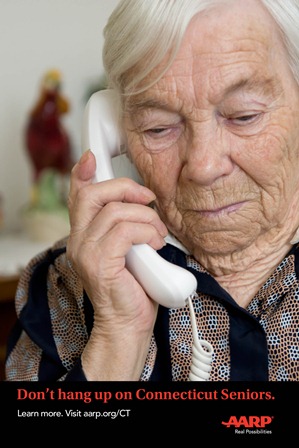AARP Hearing Center

AARP Connecticut has submitted testimony on legislation being considered by the Connecticut General Assembly's Energy and Technology Committee (H.B. 5413) that would direct the Public Utilities Regulatory Authority (PURA) to investigate the feasibility of modernizing telecommunications service in Connecticut. AARP feels the legislation is unneccesary given PURA's ability to open a docket whenever it chooses. If the Legislature moves forward with such legislation, we recommend that it include language that would require PURA to prepare and submit a report to the Legislature after gathering critical market information and conducting their investigation in a contested proceeding.
AARP’s policy on telecommunications services supports efficient, transparent, and fair markets for consumers and ensuring protections that promote and safeguard their health, safety, and economic interests. We fully support the transition to state-of-the-art telecommunications networks, technological innovation, and economic development. We are hopeful that all citizens will be able to partake in the benefits that advancements in telecommunications service make possible. However, this is not possible if such services are priced beyond the means of average citizens or beyond the accountability of consumer protections designed to provide all citizens with access to essential telecommunications services.
Telephone service is a basic necessity, particularly for older adults, who are more likely than any other age group to rely on landline service to not only maintain social contact but preserve health and safety.
- Today, many older Americans use landline service for medical monitoring of pacemakers, implantable cardiac defibrillators – and other lifesaving devices.
- They use landline service for home security.
- Older Americans rely on landline service in an emergency. When the power goes out, they need to be able to communicate.
AARP embraces the use of new technology and we recognize, as does the FCC, that the telecommunications industry is in a state of transition. But, when it comes to replacing reliable, affordable landline service – any new technology must be as good or better than the current product, and it must include a robust set of consumer protections. At this time, wireless service as a replacement for landline service does not meet these needs.
AARP is concerned about the reliability of the telecommunications network and the possible offering of alternative services that are unable to support health and safety systems, including medical monitoring systems, burglar alarms, and communications equipment for the hearing impaired and homebound elderly.
Any legislation that would examine telecommunications regulations should require that the PURA investigate and approve any actions taken by telephone service providers that would have an adverse effect on service. This legislation should require the PURA to investigate and report on the many complex issues raised by the actions of telecommunication providers who seek to abandon copper-wire landline systems in favor of less reliable and affordable alternatives. It should also examine the feasibility of regulating Voice Over Internet Protocol (VOIP) services where the FCC or federal law has not expressly prohibited it.
Read AARP's full testimony here.































































